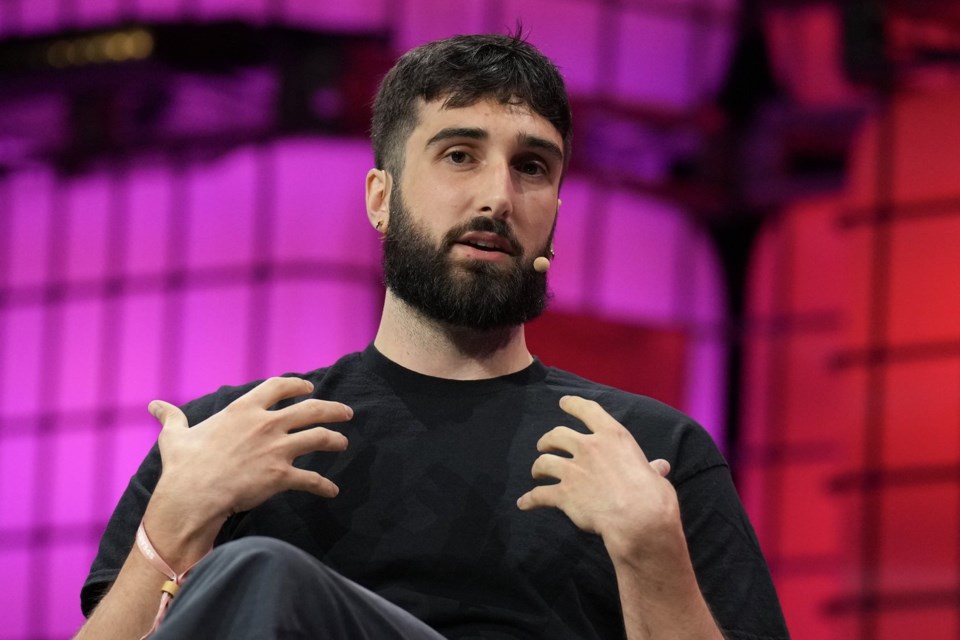TORONTO — The head of 91Ô´´ artificial intelligence darling Cohere says the technology is not bound to exceed human capabilities any time soon and if it does, he's skeptical any sci-fi like scenarios will arise.
The prediction from Aidan Gomez came Tuesday at the Collision tech conference in Toronto, where the Cohere co-founder and chief executive spoke of how AI models are on track to become smarter and even more capable.
However, he feels those advances have led to a "philosophical" divide among the industry, which has been rife with debate about where the technology is headed — and how fast.
"I'm of the opinion that it's going to take us a while to exceed human capabilities uniformly," Gomez said.
The more gains the technology makes, the more likely it is to spark an existential crisis, some, including AI pioneer Geoffrey Hinton, have argued.
But Gomez, whose company has received funding from Hinton and whose co-founder Nick Frosst was one of Hinton's proteges, rebutted those views Tuesday.
Gomez described himself as "more skeptical about the bad, the doomsday scenarios and the fear mongering, the 'Terminator' style narratives" — a reference to the 1984 film, where a cyborg assassin from the future targets a woman whose unborn son will lead the human resistance against a machine-led uprising.
"The notion that the technology is going to start self-improving, that it's going to start manipulating people, that it's going to take over, seize power and displace humans, that's a sci-fi narrative and I am empathetic," Gomez said.
"But I just don't think it's true."
He also rejected the idea that the rise of AI will upend the job market, resulting in mass unemployment, but he conceded some sectors will see reductions.
"I'm a big believer in augmentation and not displacement, so I don't foresee people losing jobs," he said.
He explained that his view was shaped by the fact that many countries have low unemployment levels.
"We want to be doing more and we don't have the people to do it and so we need to make the people we do have much more productive," he said.
Gomez's remarks come as AI continues to be a hot topic with companies looking at how to better use the tool to bring efficiencies to their business and countries considering whether the technology will have unintended consequences they must prepare for.
Many in the industry have predicted AI will create or exacerbate bias, discrimination, echo chambers, fake news, terrorism and security threats.
Gomez's opinions carry a lot of weight within the tech sector because he is best known for co-authoring a research paper at the age of 20 that delved into the then-novel concept of the transformer — a facet of language processing that can identify relationships between sequential data like words in a sentence.
Later, he co-founded Cohere, which develops AI for enterprise use, meaning it helps businesses build powerful applications by using large language models (LLMs) — algorithms that use massive data sets to recognize, translate, predict or generate text and other content.
The Toronto-based business's valuation surpassed $2.1 billion last year, making Gomez's talk one of the buzziest scheduled for Collision.
Later Tuesday, Collision hosted the vice-president of strategy and operations for Google's research arm.
Maya Kulycky told audiences companies like hers are constantly thinking about the unintended consequences of AI and how to guard against them.
Google, she said, uses so-called red teaming, a practice where companies take an adversarial approach to reviewing their systems in order to uncover vulnerabilities or risks that others may exploit.
The company also has a series of AI principles, including "be accountable" and "don’t enable or create bias."
"When there are mistakes, there has to be responsibility and then an ability to say, 'Hey, remediation has to happen,'" Kulycky said.
Asked whether the sector will be able to extinguish AI's problems or at least reduce them to a manageable level, she said she had her doubts because she said "any time you are being bold you have new challenges."
"Perfection as a goal is not something I want to sugar coat. I don’t know if it is ever achievable but it is a worthy enterprise," she said.
Later this week, Hinton, tennis star Maria Sharapova and Indigenous rights advocate Autumn Peltier are all expected on Collision's stages.
This year marks the final year the travelling conference that made its Toronto debut in 2019 will be hosted in the city.
Organizers have said the event will shift to 91Ô´´ next year and be transformed into a North American iteration of the Web Summit conferences hosted in Portugal, Brazil and Qatar.
This report by The 91Ô´´ Press was first published June 18, 2024.
Tara Deschamps, The 91Ô´´ Press



